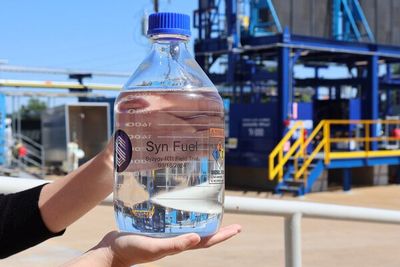results are in
Houston company tests all-electric CO2-to-fuel production technology

Syzygy Plasmonics has tested its all-electric CO2-to-fuel production technology. Photo courtesy of Syzygy
Houston-based clean energy company Syzygy Plasmonics has successfully tested all-electric CO2-to-fuel production technology at RTI International’s facility at North Carolina’s Research Triangle Park.
Syzygy says the technology can significantly decarbonize transportation by converting two potent greenhouse gases, carbon dioxide and methane, into low-carbon jet fuel, diesel, and gasoline.
Equinor Ventures and Sumitomo Corp. of Americas sponsored the pilot project.
“This project showcases our ability to fight climate change by converting harmful greenhouse gases into fuel,” Trevor Best, CEO of Syzygy, says in a news release.
“At scale,” he adds, “we’re talking about significantly reducing and potentially eliminating the carbon intensity of shipping, trucking, and aviation. This is a major step toward quickly and cost effectively cutting emissions from the heavy-duty transport sector.”
At commercial scale, a typical Syzygy plant will consume nearly 200,000 tons of CO2 per year, the equivalent of taking 45,000 cars off the road.
“The results of this demonstration are encouraging and represent an important milestone in our collaboration with Syzygy,” says Sameer Parvathikar, director of renewable energy and energy storage at RTI.
In addition to the CO2-to-fuel demonstration, Syzygy's Ammonia e-Cracking™ technology has completed over 2,000 hours of performance and optimization testing at its plant in Houston. Syzygy is finalizing a site and partners for a commercial CO2-to-fuel plant.
Syzygy is working to decarbonize the chemical industry, responsible for almost 20 percent of industrial CO2 emissions, by using light instead of combustion to drive chemical reactions.